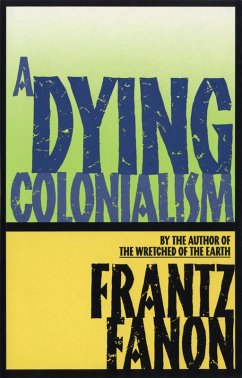
The Algerian Revolution Against French Colonialism (eBook, ePUB)

PAYBACK Punkte
0 °P sammeln!
This work presents a comprehensive analysis of the Algerian Revolution (1954-1962), examining the multifaceted struggle for independence against French colonial rule. The revolution was not only a military conflict but also a political, social, and ideological battle that reshaped national identities, historical narratives, and the global anti-colonial movement. Through an in-depth exploration of the revolution's origins, key events, and its aftermath, the study highlights the complexity of the conflict, which was shaped by internal divisions, regional dynamics, and international pressures.The...
This work presents a comprehensive analysis of the Algerian Revolution (1954-1962), examining the multifaceted struggle for independence against French colonial rule. The revolution was not only a military conflict but also a political, social, and ideological battle that reshaped national identities, historical narratives, and the global anti-colonial movement. Through an in-depth exploration of the revolution's origins, key events, and its aftermath, the study highlights the complexity of the conflict, which was shaped by internal divisions, regional dynamics, and international pressures.
The narrative begins by tracing the roots of anti-colonial resistance, from early uprisings in the 19th century to the birth of the National Liberation Front (FLN) in 1954. It then delves into pivotal moments, such as the launch of guerrilla warfare, the Battle of Algiers, and the Evian Accords, providing detailed commentary on primary sources, revolutionary strategies, and French counterinsurgency tactics, including the widespread use of torture and mass repression. The analysis underscores the roles of key figures such as Ahmed Ben Bella, Houari Boumédiène, Djamila Bouhired, and Charles de Gaulle, and explores the impact of ideological rifts within the FLN, notably between political leaders and military commanders.
The study also addresses the broader cultural and social dimensions of the revolution, with a focus on the participation of women, the influence of intellectuals like Frantz Fanon, and the symbolic importance of media and propaganda. The work examines the traumatic legacies of the revolution, particularly for the harkis-Algerians who fought for France-and the pieds-noirs, who fled en masse after independence. The exodus of settlers, the marginalization of loyalist Algerians, and the political struggles of post-independence governance are analyzed as enduring consequences of the war.
Furthermore, the study situates the Algerian Revolution within the global context of decolonization and Cold War geopolitics, illustrating how Algeria's liberation struggle became a model for other anti-colonial movements. The FLN's diplomatic strategy and its alignment with the Non-Aligned Movement positioned Algeria as a leader in the Global South, even as internal divisions and authoritarianism marred the post-colonial state-building process.
The work concludes by reflecting on the contested memory of the revolution in both Algeria and France. In Algeria, the revolution remains the foundation of national identity but has also been used to legitimize political repression. In France, the war continues to provoke debates over historical accountability, colonial amnesia, and the role of immigrants and their descendants in French society. By synthesizing historical analysis with cultural and political critique, this study offers a nuanced understanding of the Algerian Revolution as both a transformative historical event and a complex legacy that continues to shape contemporary realities.
The narrative begins by tracing the roots of anti-colonial resistance, from early uprisings in the 19th century to the birth of the National Liberation Front (FLN) in 1954. It then delves into pivotal moments, such as the launch of guerrilla warfare, the Battle of Algiers, and the Evian Accords, providing detailed commentary on primary sources, revolutionary strategies, and French counterinsurgency tactics, including the widespread use of torture and mass repression. The analysis underscores the roles of key figures such as Ahmed Ben Bella, Houari Boumédiène, Djamila Bouhired, and Charles de Gaulle, and explores the impact of ideological rifts within the FLN, notably between political leaders and military commanders.
The study also addresses the broader cultural and social dimensions of the revolution, with a focus on the participation of women, the influence of intellectuals like Frantz Fanon, and the symbolic importance of media and propaganda. The work examines the traumatic legacies of the revolution, particularly for the harkis-Algerians who fought for France-and the pieds-noirs, who fled en masse after independence. The exodus of settlers, the marginalization of loyalist Algerians, and the political struggles of post-independence governance are analyzed as enduring consequences of the war.
Furthermore, the study situates the Algerian Revolution within the global context of decolonization and Cold War geopolitics, illustrating how Algeria's liberation struggle became a model for other anti-colonial movements. The FLN's diplomatic strategy and its alignment with the Non-Aligned Movement positioned Algeria as a leader in the Global South, even as internal divisions and authoritarianism marred the post-colonial state-building process.
The work concludes by reflecting on the contested memory of the revolution in both Algeria and France. In Algeria, the revolution remains the foundation of national identity but has also been used to legitimize political repression. In France, the war continues to provoke debates over historical accountability, colonial amnesia, and the role of immigrants and their descendants in French society. By synthesizing historical analysis with cultural and political critique, this study offers a nuanced understanding of the Algerian Revolution as both a transformative historical event and a complex legacy that continues to shape contemporary realities.
Dieser Download kann aus rechtlichen Gründen nur mit Rechnungsadresse in A, B, CY, CZ, D, DK, EW, E, FIN, F, GR, H, IRL, I, LT, L, LR, M, NL, PL, P, R, S, SLO, SK ausgeliefert werden.













